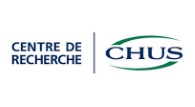Annual Report

2023-2024 Annual Report
Researchers, the student community and the professional staff who make up our research teams at the Centre de recherche du Centre hospitalier universaitaire de Sherbrooke (CRCHUS) are once again offering us discoveries and advances that bring hope.
Discoveries of the year
Ribose Synthesis Opens New Pathways to Cancer Cures
The research conducted by Professor François Bachand’s team has revealed a novel mechanism by which RNA-binding proteins, such as Seb1, regulate the progression of RNA polymerase I. This enzyme synthesizes ribosomal RNAs (rRNAs), which are essential for ribosome production. Increased rRNA synthesis and maturation contribute to cancer cell proliferation and survival, which often rely on elevated ribosome production for rapid growth. Understanding how proteins control ribosome synthesis and maturation could lead to therapies targeting this process, potentially slowing or halting tumour progression.
Additional Tools to Protect People Living with Diabetes
Diabetic kidney disease remains a major health issue, impacting patients’ quality of life. Current treatments fail to target the dysfunction and loss of podocytes—cells crucial for kidney filtration. This study, conducted by Professors Pedro Geraldes, Dr. Anne-Marie Côté, and François-Michel Boisvert, has shown that preventing diabetes-induced expression and activity of the protein SHP-1 restores podocin stability, essential for podocyte function. The team also discovered a novel mechanism where SHP-1 disrupts protein stability by modulating SUMOylation, leading to degradation. Inhibiting SHP-1 could protect against diabetes-induced podocyte dysfunction, helping to identify at-risk individuals and providing additional therapeutic options.
New Advances in Tractography
Researchers at the CRCHUS and Université de Sherbrooke, including Maxime Descoteaux and Pierre-Marc Jodoin, have made advances in tractography, an MRI-based technique for mapping axonal fibre pathways in the brain. They developed deep neural networks to analyze brain connectivity, enhancing the understanding of neurodegenerative diseases. Their GESTA method (Generative Sampling in Bundle Tractography using Autoencoders) addresses gaps in axonal fibre analysis. A second publication features their reinforcement learning-based approach to create the first neural network capable of surpassing traditional tractography methods in accuracy.
The Importance of Diversity and Representation in Clinical Practice Guidelines
Félix Camirand-Lemyre, Dr. François Lamontagne and their teams carried out this project based on a large cohort study of 434,851 severe COVID-19 cases across 54 countries. They observed that 40.1% of patients received corticosteroids, as recommended by the WHO, with significant geographical variations in usage. Countries not involved in clinical trials contributing to these guidelines showed slower adoption rates. The study underscores the importance of diversity and representation in clinical trials to promote rapid adoption of best practices globally.
A New Therapeutic Avenue for Muscular Dystrophies
Published in Science Translational Medicine, Florian Bentzinger’s team identified Apelin-13 (AP-13), a hormone involved in blood vessel formation, as a potential treatment for muscular dystrophies. These genetic disorders often affect children, leading to muscle function loss. The team found that skeletal muscle microvessels are reduced in many dystrophies. By enhancing vascularization around stem cells, AP-13 supports regenerative functions, slowing disease progression and strengthening muscle fibres without adverse effects on the heart or circulatory system. This discovery could lead to effective treatments for these rare diseases.
New Evidence of Quiescent Cells in the Small Intestine
Published in Cells, Jean-François Beaulieu’s team studied primary cilia, sensory organelles on cell surfaces transmitting signals for tissue homeostasis and cancer development. Most quiescent cells bear primary cilia, yet differentiated villous cells and crypt progenitors in the small intestine are devoid of them. The team identified a second population of quiescent crypt cells with primary cilia. This discovery suggests new regulatory mechanisms in stem cell dynamics, offering insights into inflammatory or cancerous intestinal diseases.
